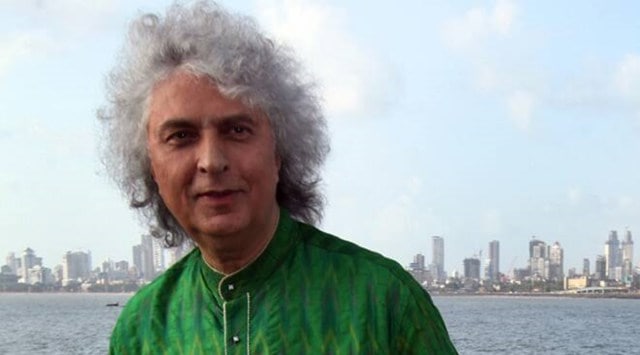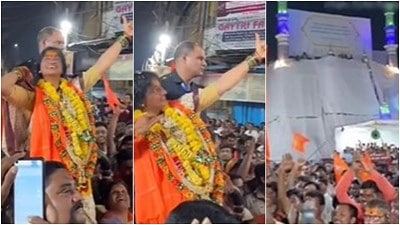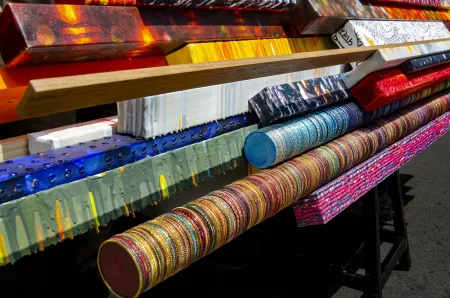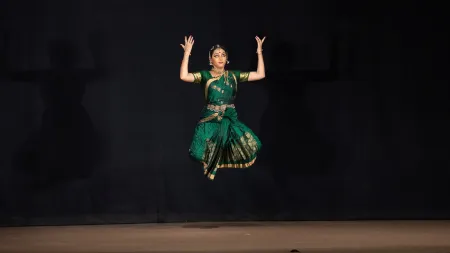- India
- International
Pt Shiv Kumar Sharma, who placed santoor on the centre stage of classical music, passes away
He had been suffering from kidney-related issues for the last six months and was on dialysis. He passed away due to cardiac arrest.
 Pandit Shivkumar Sharma passes away (file)
Pandit Shivkumar Sharma passes away (file)Pt Shiv Kumar Sharma, who exalted the santoor – once a little-known trapezoid-shaped, stringed instrument – from the folk circuit of Jammu and Kashmir and placed it on the proscenium alongside other more traditional and heavyweight classical instruments such as the sitar and sarod, passed away in Mumbai after suffering a cardiac arrest. He was 84 and is survived by his wife Manorama, and sons Rahul and Rohit.
But the path to owning an instrument that has been an accompaniment for Sufiana mausiqi (music) for centuries and turning it into one that would fit into the complex world of ragas, riyaaz and relentless critique — all this while creating slides and embellishments like other string instruments but not imitating them — was long and arduous.
Our cultural world is poorer with the demise of Pandit Shivkumar Sharma Ji. He popularised the Santoor at a global level. His music will continue to enthral the coming generations. I fondly remember my interactions with him. Condolences to his family and admirers. Om Shanti.
— Narendra Modi (@narendramodi) May 10, 2022
The challenges he faced as he worked to place the santoor on the classical centre stage, Sharma would sometimes say, were nothing compared to the meditative trance it offered him. In the process, he created music that will be remembered for the inventive inflections he created as he handled a demanding and difficult instrument.
In a world that encourages slick branding, Sharma did the extraordinary – he made great music without talking much about it.
Sitar exponent and Grammy winner Ustad Shujaat Khan, who knew Sharma closely, told The Indian Express, how Sharma was for him a point of reference of dignity, grace and professionalism. “He was the voice that every Indian classical musician should have in his head. I am not qualified to comment on his greatness – that’s for the world to see. I was not his student and didn’t learn from him, but I have immense respect and affection for him and I pray that one day, I can be like him. Of course I am Vilayat Khan’s son, but temperamentally, I have always followed Shiv ji. He was my last hero,” said Khan.
Sharma began learning music from his father, classical vocalist Uma Dutt Sharma, who worked as a music supervisor at Radio Kashmir in Jammu and later, Kashmir. The young Sharma was, however, soon drawn to the tabla and learnt the basics from his father and began accompanying in the children’s programmes at the radio station when he was about eight.

Once Uma Dutt was transferred to Radio Kashmir (Srinagar), he suggested that a teenage Sharma try his hand at the santoor.
Unlike other classical string instruments that are strummed with fingers or a plectrum, the santoor is played with small mallets created out of walnut wood. It is said to be the only string instrument that isn’t played with one’s fingers and that makes it harder to produce the exactness of microtones – the hallmark of classical music.
Yet Sharma stuck to the instrument, literally nurturing the instrument on his lap. His first national performance was in Mumbai, with the icons of classical music – Ut Bade Ghulam Ali Khan, Ut Vilayat Khan, Pt Ravi Shankar, Ut Amir Khan, Ut Mushtaq Hussain, Pt Omkarnath Thakur, Kesarbai Kerkar, Moghubai Kurdikar, Siddheshwari Devi and Rasoolan Bai, among others – in attendance. Sharma was then 17. It was around the same time that filmmaker V Shantaram asked him to play the santoor in Jhanak Jhanak Payal Baaje (1955). Sharma composed a piece that featured Kathak dancer Gopi Krishna in a seminal dance section from the film.
“Pt Shivkumar Sharma’s contribution to music is undoubtedly that of a pathbreaking artiste and composer. But for me, he will forever be the icon who proved that tradition is not set in stone. It is dynamic and accepts new contributions, experiments and forms from those who are able to wear down the walls of orthodoxy with their excellence, determination and brilliance,” said Hindustani classical vocalist Shubha Mudgal.
Not one to be tied down to a job, a young Sharma left Srinagar for Mumbai, with Rs 500 in his pocket and santoor in tow. He struggled for a few years before managing to bring out a solo album in 1960. For many years, he was a sessions musician in films (he played tabla in Mose chhal from Chetan Anand’s Guide) before teaming up with flute exponent Pt Hari Prasad Chaurasia for an album, Call of the Valley (1967).
It was a unique experiment because the santoor and flute, two folk instruments considered lower down in the pecking order of classical music, were playing raagdaari and hitting it out of the park. Offers from filmmakers followed, leading the two to team up as Shiv-Hari and compose music for films such as Silsila (1981), Faasle (1985), Chandni (1989) and Lamhe (1991), among others. The two were to perform a jugalbandi concert this month at Bhopal’s Bharat Bhawan in what was being called as a reunion. According to Pt Hari Prasad’s nephew and flautist Rakesh Chaurasia, “Since he was also a tabla player, his accent of rhythm in the hammered melodies will go down in the history of classical music as a chapter that can be studied in great detail.”
Despite massive succes in films, classical music remained Sharma’s focus and he carried the delicate santoor to concerts around the world. “Classical music is not for entertainment. It is to take you on a meditative journey, ye toh mehsoos karne ki cheez hai (This has to be experienced),” he would often say.
For decades, Sharma’s santoor spoke a unique language, one that the world didn’t know before him, one that was sometimes hymnal and on others idyllic, sometimes from a world of deep-rooted classicality and on others allowed one to navigate life’s chaos to be amid transcendental silence — the kind that only his music could generate.
The Governor of Maharashtra, Bhagat Singh Koshyari, in a condolence message, said, “The news of the demise of Pt Shiv Kumar Sharma is shocking. He was instrumental in taking Santoor and Indian classical music to the global stage. Pt Sharma was a great artist, guru, researcher, thinker and above all a kind-hearted human being. Pt Shiv Kumar Sharma mentored many disciples and enriched the world of music with his multifarious contributions. I pay my respectful homage to Pt Shiv Kumar Sharma and convey my deepest condolences to Pt Rahul Sharma and to other members of the bereaved family.”
Maharashtra Chief Minister Uddhav Thackeray has announced a state funeral for Sharma. His funeral will take place at Pawan Hans tomorrow afternoon around 3 pm with full state honour. Visitors will be allowed to pay their respects and see Sharma for the last time at his son Rahul’s home in Juhu from 10 am to 1 pm.
(With inputs from Yogesh Naik)
📣 For more lifestyle news, follow us on Instagram | Twitter | Facebook and don’t miss out on the latest updates!
More Lifestyle
Apr 18: Latest News
- 01
- 02
- 03
- 04
- 05


































